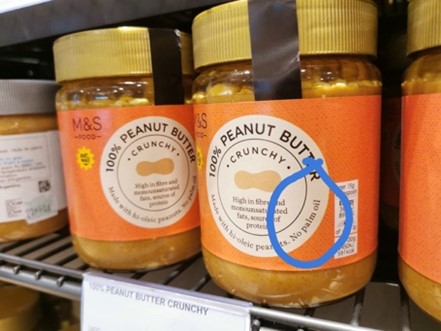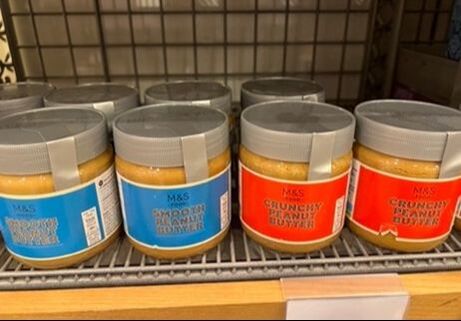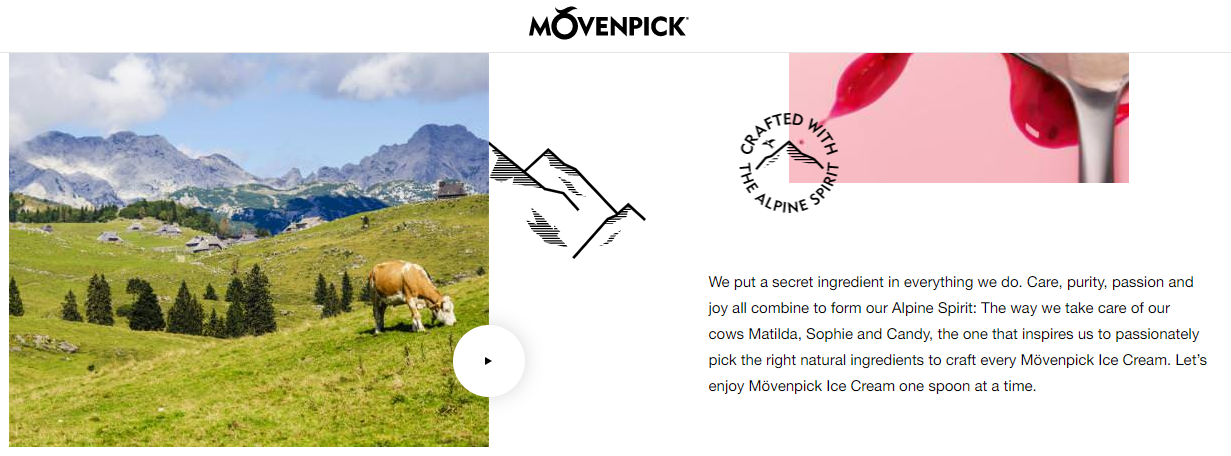Global Retailers in Malaysia Respecting No Palm Oil Marketing Regulations
But a market study shows that some foreign brands continue to export products with NPO labels to Malaysia
In an on-going program to ensure that Malaysian consumers are not victims of false and deceptive marketing as defined by laws, the Malaysian Palm Oil Council (MPOC) conducted an investigation in late 2021, the results of which are being publicized now.
The key findings of this investigation are that global companies with retail units in Malaysia, Marks & Spencer for example, are respecting the Malaysian laws against deceptive advertising in “palm oil free” or “no palm oil” labels. Marks & Spencer, which sold peanut butters with a “No Palm Oil” label in 2019 has replaced the product with a legally compliant label in 2022 as per the images below.
In an on-going program to ensure that Malaysian consumers are not victims of false and deceptive marketing as defined by laws, the Malaysian Palm Oil Council (MPOC) conducted an investigation in late 2021, the results of which are being publicized now.
The key findings of this investigation are that global companies with retail units in Malaysia, Marks & Spencer for example, are respecting the Malaysian laws against deceptive advertising in “palm oil free” or “no palm oil” labels. Marks & Spencer, which sold peanut butters with a “No Palm Oil” label in 2019 has replaced the product with a legally compliant label in 2022 as per the images below.
Global retail operators have obviously stuck to the letter of the law in Malaysia and removed products with labels that violate labeling regulations in Malaysia.
What is surprising is the continued presence of No Palm Oil or Palm Oil Free labels in Malaysian-owned retail outlets.
Data showed that the retail chain with the most violations of label laws is Village Grocer, Malaysia. Of 18 locations surveyed, 17 locations carried products with No Palm Oil labels with a Total Frequency of 500 and an average of 29.4 frequency per outlet.
It is not surprising that the majority of products found with NPO labels in Village Grocer and Jaya Grocer, another Malaysian chain store, originated from Australia and New Zealand where the absence of regulations to protect consumers from deceptive advertising allows product manufacturers to display misleading information.
With so many types of products being offered to Malaysian consumers per store, its understandable that the Malaysian hypermarkets may have missed the fact that some of their imports carried labels with No Palm Oil claims.
What is surprising is that EU products like Belgian based maker of cleaning products, Ecover and Germany based chocolate brand Meybona are still displaying NPO labels despite their illegality in Europe. Italy based baked goods brands including Misura and Vitavigor were also found displaying the No Palm Oil claim.
What makes the situation interesting, is that the packaging or labels for these products on their European websites, appear to be different from what was seen in Malaysia. Internet searches for product labels with No Palm Oil claims, for Movenpick and Ecover products in the US and Europe, did not show any results.
These would seem to be in line with the European regulations governing truth in labels so why were these branded products with No Palm Oil labels still found in Malaysian retailers? Are European manufacturers dumping older product with labels that are illegal in Europe, into the Malaysian market?
In the case of merchandise with No Palm Oil labels, European legal expert, Paolo Vergano has said that:
“palm oil-free’ labels on products are arguably illegal under EU law. Misleading green claims, supposed to empower consumers to make sustainable food choices, appear to become a further ground to challenge ‘no palm oil’ labels. In 2024, the European Commission intends to publish a proposal for a sustainable food labelling framework. The presentation will also discuss front-of-pack nutrition labelling, some forms of which can be considered as discriminatory towards palm oil.”
Paolo Vergano, as a legal expert, makes a valid point on making green claims simply because the product does not contain palm oil. Climate scientists have been ringing the alarm bells on the environmental impact of agriculture sectors from North America to Europe. What this means to brands like Movenpick, is that their substitute for palm oil could represent a grave threat to biodiversity as well as contribute to climate change.
No Palm Oil. A cheap marketing ruse for Western brands
The Movenpick website is typical of brands that hide their environmental impact with appealing words like “purity and passion.” Even to the extent of naming the cows that supply their milk as “Matilda, Sophie and Candy.”
What is surprising is the continued presence of No Palm Oil or Palm Oil Free labels in Malaysian-owned retail outlets.
Data showed that the retail chain with the most violations of label laws is Village Grocer, Malaysia. Of 18 locations surveyed, 17 locations carried products with No Palm Oil labels with a Total Frequency of 500 and an average of 29.4 frequency per outlet.
It is not surprising that the majority of products found with NPO labels in Village Grocer and Jaya Grocer, another Malaysian chain store, originated from Australia and New Zealand where the absence of regulations to protect consumers from deceptive advertising allows product manufacturers to display misleading information.
With so many types of products being offered to Malaysian consumers per store, its understandable that the Malaysian hypermarkets may have missed the fact that some of their imports carried labels with No Palm Oil claims.
What is surprising is that EU products like Belgian based maker of cleaning products, Ecover and Germany based chocolate brand Meybona are still displaying NPO labels despite their illegality in Europe. Italy based baked goods brands including Misura and Vitavigor were also found displaying the No Palm Oil claim.
What makes the situation interesting, is that the packaging or labels for these products on their European websites, appear to be different from what was seen in Malaysia. Internet searches for product labels with No Palm Oil claims, for Movenpick and Ecover products in the US and Europe, did not show any results.
These would seem to be in line with the European regulations governing truth in labels so why were these branded products with No Palm Oil labels still found in Malaysian retailers? Are European manufacturers dumping older product with labels that are illegal in Europe, into the Malaysian market?
In the case of merchandise with No Palm Oil labels, European legal expert, Paolo Vergano has said that:
“palm oil-free’ labels on products are arguably illegal under EU law. Misleading green claims, supposed to empower consumers to make sustainable food choices, appear to become a further ground to challenge ‘no palm oil’ labels. In 2024, the European Commission intends to publish a proposal for a sustainable food labelling framework. The presentation will also discuss front-of-pack nutrition labelling, some forms of which can be considered as discriminatory towards palm oil.”
Paolo Vergano, as a legal expert, makes a valid point on making green claims simply because the product does not contain palm oil. Climate scientists have been ringing the alarm bells on the environmental impact of agriculture sectors from North America to Europe. What this means to brands like Movenpick, is that their substitute for palm oil could represent a grave threat to biodiversity as well as contribute to climate change.
No Palm Oil. A cheap marketing ruse for Western brands
The Movenpick website is typical of brands that hide their environmental impact with appealing words like “purity and passion.” Even to the extent of naming the cows that supply their milk as “Matilda, Sophie and Candy.”
What Movenpick does not share with its customers are the harsh facts that the dairy industry in Europe carries a heavy footprint on the environment. On top of that, any Movenpick product that contains cocoa, could be contributing to deforestation in Africa. Even Italian grown hazelnuts used in Movenpick ice creams have been fingered as bad for land, water and air.
Noosh brands from the US is equally guilty in this department. The company plays up its use of almonds, Californian almonds to be precise, as the foundation for its marketing programs. For Malaysian consumers who are concerned about the environmental impact of their food choices, almonds are a poor choice. The problems created by a booming demand for almonds and the subsequent use of pesticides led the industry to “send bees to war” according to this report in The Guardian. A follow up report by The Guardian declared that “almonds are out for environmentally concerned consumers.” Unconvinced Malaysia consumers should read Citizen Sustainable’s blog Are Almonds Bad for the Environment?
While making No Palm Oil claims may give Western brands an edge in surviving, one has to question as to why products with No Palm Oil claims continue to be shipped to Malaysia, where palm oil has made a difference in so many lives.
The answer is most likely that no one read the labels. No Palm Oil claims appeal to too small of a consumer segment for it to warrant attention. Western brands may use No Palm Oil claims on their labels to distract consumer attention away from the environmental questions on their main ingredients but this has been an ineffective marketing ploy, even in Europe, to capture market share.
But as long as consumer protection in truthful marketing is a priority for governments, regulations are the best form of protection.
Front of Pack Labels For Truth in Labels
There are many unsavory truths which European manufacturers are hiding from their customers. These could be exposed if environmental values, as proposed by Eco-Score is added to the nutritional values in Nutri-Score or Nutri-Inform.
Ecover for example, claims that replacing palm oil with French grown rapeseed will save forests and reduce travel miles. This is a self-contradictory statement on two fronts. First off, as a member of the RSPO, the palm oil Ecover uses is certified as sustainable unless they disagree with the RSPO is doing. Secondly, the claim of reduced travel miles sounds great for its European customers but make no sense when its repeated by its corporate website in Singapore.
Ecover could find itself further in controversy if the palm oil replacement ends up being sourced from algae. Back in 2014, Ecover announced it would switch to synthetically manufactured oils to replace palm oil. This was met with a call by organizations including Friends of the Earth, Center for Food Safety, Consumers Union, Women’s Voices for the Earth, Clean Production Action, Organic Consumers Association, and ETC Group, as well as watchdog and farmer groups in Brazil concerned about the environmental impacts of increased demand for Brazilian sugarcane to cancel its plans. The groups called into question Ecover’s foundation claim that it is “natural” should it proceed with synthetic, genetically modified versions of “plant-based” ingredients.
Adding Eco-Score will no doubt add to the already controversial development of a Front of Pack label for common usage in Europe. But its addition should be essential to prevent dubious “eco” claims like Ecover’s and by default, reduce the number of No Palm Oil labels in Malaysian retail.
Published October, 2022. CSPO Watch
Noosh brands from the US is equally guilty in this department. The company plays up its use of almonds, Californian almonds to be precise, as the foundation for its marketing programs. For Malaysian consumers who are concerned about the environmental impact of their food choices, almonds are a poor choice. The problems created by a booming demand for almonds and the subsequent use of pesticides led the industry to “send bees to war” according to this report in The Guardian. A follow up report by The Guardian declared that “almonds are out for environmentally concerned consumers.” Unconvinced Malaysia consumers should read Citizen Sustainable’s blog Are Almonds Bad for the Environment?
While making No Palm Oil claims may give Western brands an edge in surviving, one has to question as to why products with No Palm Oil claims continue to be shipped to Malaysia, where palm oil has made a difference in so many lives.
The answer is most likely that no one read the labels. No Palm Oil claims appeal to too small of a consumer segment for it to warrant attention. Western brands may use No Palm Oil claims on their labels to distract consumer attention away from the environmental questions on their main ingredients but this has been an ineffective marketing ploy, even in Europe, to capture market share.
But as long as consumer protection in truthful marketing is a priority for governments, regulations are the best form of protection.
Front of Pack Labels For Truth in Labels
There are many unsavory truths which European manufacturers are hiding from their customers. These could be exposed if environmental values, as proposed by Eco-Score is added to the nutritional values in Nutri-Score or Nutri-Inform.
Ecover for example, claims that replacing palm oil with French grown rapeseed will save forests and reduce travel miles. This is a self-contradictory statement on two fronts. First off, as a member of the RSPO, the palm oil Ecover uses is certified as sustainable unless they disagree with the RSPO is doing. Secondly, the claim of reduced travel miles sounds great for its European customers but make no sense when its repeated by its corporate website in Singapore.
Ecover could find itself further in controversy if the palm oil replacement ends up being sourced from algae. Back in 2014, Ecover announced it would switch to synthetically manufactured oils to replace palm oil. This was met with a call by organizations including Friends of the Earth, Center for Food Safety, Consumers Union, Women’s Voices for the Earth, Clean Production Action, Organic Consumers Association, and ETC Group, as well as watchdog and farmer groups in Brazil concerned about the environmental impacts of increased demand for Brazilian sugarcane to cancel its plans. The groups called into question Ecover’s foundation claim that it is “natural” should it proceed with synthetic, genetically modified versions of “plant-based” ingredients.
Adding Eco-Score will no doubt add to the already controversial development of a Front of Pack label for common usage in Europe. But its addition should be essential to prevent dubious “eco” claims like Ecover’s and by default, reduce the number of No Palm Oil labels in Malaysian retail.
Published October, 2022. CSPO Watch
|
|
|



